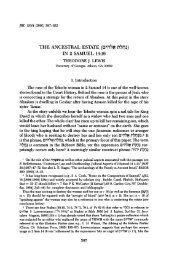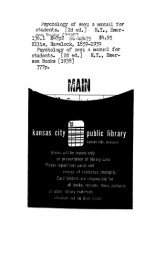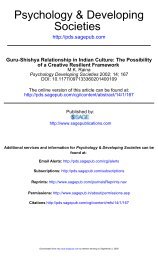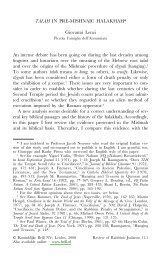Religion, Theology, and Philosophy on the Way to Being and Time ...
Religion, Theology, and Philosophy on the Way to Being and Time ...
Religion, Theology, and Philosophy on the Way to Being and Time ...
Create successful ePaper yourself
Turn your PDF publications into a flip-book with our unique Google optimized e-Paper software.
I. M. Fehér / Research in Phenomenology 39 (2009) 99–131 119<br />
entirely c<strong>on</strong>stitutive for Christian experience of life. It is a shift in being, which<br />
at <strong>the</strong> very moment of becoming aware of itself, gains awareness of itself in<br />
terms of a being that has become what it actually is. It is solely because it has<br />
become what it is that it is what it is—<str<strong>on</strong>g>and</str<strong>on</strong>g> it does also have a specifi c awareness<br />
of it. Indeed, Christian experience of life is not <strong>on</strong>ly characterized by<br />
<strong>the</strong> fact that it has become what it is but also, <str<strong>on</strong>g>and</str<strong>on</strong>g> with equal primordiality,<br />
by <strong>the</strong> fact that <strong>the</strong> event of having become is accompanied by some kind of<br />
a c<strong>on</strong>sciousness of having become, no less than of <strong>the</strong> fact that this havingbecome<br />
has not been initiated <str<strong>on</strong>g>and</str<strong>on</strong>g> performed by itself. 57 By all means, its<br />
having-become bel<strong>on</strong>gs in an indispensable <str<strong>on</strong>g>and</str<strong>on</strong>g> irrevocable way <strong>to</strong> its present<br />
being. 58<br />
Now it is my claim that it is because it is not possible <strong>to</strong> be a Christian<br />
without having this specifi c kind of “knowledge” (indeed, a hermeneutic preunderst<str<strong>on</strong>g>and</str<strong>on</strong>g>ing)<br />
of being <strong>on</strong>e—namely, of having become or been reborn by<br />
divine grace <strong>to</strong> be <strong>on</strong>e, of st<str<strong>on</strong>g>and</str<strong>on</strong>g>ing presently before God <str<strong>on</strong>g>and</str<strong>on</strong>g> reaching escha<strong>to</strong>logically<br />
forward <strong>to</strong>ward <strong>the</strong> imminent future, running ahead against it—<br />
that Christian life experience may reas<strong>on</strong>ably be claimed <strong>to</strong> experience life in<br />
its facticity, <strong>to</strong> be factical life experience. Christian religiosity, or Christian life<br />
experience, in terms of an experience of having become, opens up (a perspective<br />
or <strong>the</strong> perspective up<strong>on</strong>) factical life for <strong>the</strong> fi rst time, <strong>the</strong>refore it is factical<br />
life experience. Factical life <strong>the</strong>reby gets disclosed <str<strong>on</strong>g>and</str<strong>on</strong>g> becomes accessible for<br />
<strong>the</strong> fi rst time as such—that is, as factical life, a specifi cally <str<strong>on</strong>g>and</str<strong>on</strong>g> defi nitely thisworldly<br />
life. It is due <strong>to</strong> this having become (<str<strong>on</strong>g>and</str<strong>on</strong>g>, inseparably from it, <strong>the</strong><br />
awareness which accompanies it) that factical life is opened up. Indeed, Christian<br />
life experience does experience <strong>the</strong> whole of life—past, present, <str<strong>on</strong>g>and</str<strong>on</strong>g><br />
future—<str<strong>on</strong>g>and</str<strong>on</strong>g> thus lives temporality. It is not <strong>on</strong>ly in time but it is time. 59 It<br />
focuses <strong>on</strong> <str<strong>on</strong>g>and</str<strong>on</strong>g> centers around its having become. 60 Th e state it has overcome<br />
57) See GA 60: 121f.<br />
58) See esp. GA 60: 94: “Das Wissen über das eigene Gewordensein stellt der Explikati<strong>on</strong> eine<br />
ganz bes<strong>on</strong>dere Aufgabe. Hieraus wird sich der Sinn einer Faktizität bestimmen, die v<strong>on</strong> einem<br />
bestimmten Wissen begleitet ist. Wir reißen die Faktizität und das Wissen ausein<str<strong>on</strong>g>and</str<strong>on</strong>g>er, aber sie<br />
ist ganz urspünglich miterfahren. . . . Das Gewordensein ist nun nicht ein beliebiges Vorkommnis<br />
im Leben, s<strong>on</strong>dern es wird ständig miterfahren und zwar so, daß ihr jetziges Sein Gewordensein<br />
ist. Ihr Gewordensein ist ihr jetziges Sein.” See also ibid., 145: “Faktizität, zu der ja das<br />
‘Wissen’ gehört.” Fur<strong>the</strong>r, ibid., 93: “Wissen v<strong>on</strong> ihrem Gewordensein”; 103, 123, etc.<br />
59) See GA 60: 80, 82, 104, 116.<br />
60) See GA 60: 120: “Das christliche Leben ist nicht geradelinig, s<strong>on</strong>dern ist gebrochen: Alle umweltlichen<br />
Bezüge müssen hindurchgehen durch den Vollzugszusammenhang des Gewordenseins.”







